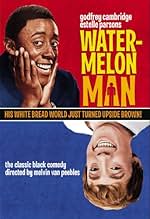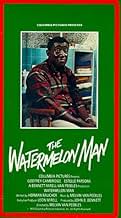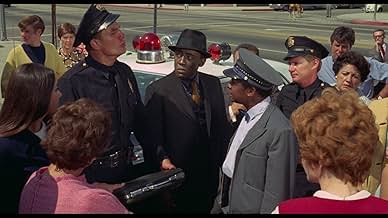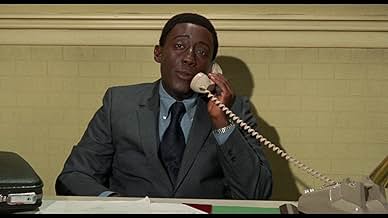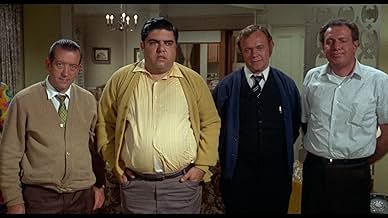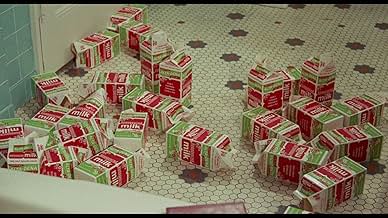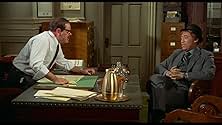IMDb RATING
6.7/10
3.2K
YOUR RATING
Jeff Gerber, a racist white man, wakes up one morning to discover that he has become black.Jeff Gerber, a racist white man, wakes up one morning to discover that he has become black.Jeff Gerber, a racist white man, wakes up one morning to discover that he has become black.
- Nominated for 1 BAFTA Award
- 1 win & 1 nomination total
Paul Williams
- Employment Office Clerk
- (as Paul H. Williams)
- Director
- Writer
- All cast & crew
- Production, box office & more at IMDbPro
Featured reviews
I first saw this film on television about 7-8 years ago. It was part of a "Heritage Network" movie special. This was hosted by Ruby Dee and Ossie Davis. I fell in love!!! I had to own this film!!! How much were they holding the film hostage for???? $20 dollars??? $100 dollars?? And so I waited for a few years. My father would keep saying to me "Aren't you going to buy that movie?" I'd say "Yeah Soon", but just didn't want to cough up the cash for it. Then it finally arrived on DVD in 2004 or so. I purchased it at Media Play. And I have watched it several times. I think that it's ahead of its time. Godfrey Cambridge plays a very disciplined white man with a nice white family. He puts on his sneakers and runs down the hill as exercise racing with the bus. Just the like the Yuppies of the 80's that wore sneakers to work then changed shoes. He was doing this in 1969.. He was an insurance man and he believed in exercise, family, all the values that this country was raging against in 1969. Then he wakes up one day and is black. All the showers in the world can't wash off the color. His whole universe changes. Some for the worse, some for the better. I have a whole new respect for Godfrey Cambridge from this film. A highly intelligent man in real life, Godfrey lets this shine through in this film. Especially poignant is when he is selling insurance to young black families. He talks straight to them, and doesn't patronize them. You will see this in the film. No hard sell, No baloney. Another tidbit that you will find interesting is that the house interior they used is the same one that they used for another famous television family.....THE PARTRIDGE FAMILY!!!!!! There is a small barely audible directors commentary with the film, and you have to listen carefully to really understand it. Seems that the film company did not treat Mr. Van Peebles very nicely. And I am putting this nicely as i can. Anyway it's a gem of a movie!!!!
I just rented this DVD and loved it. At first, Godfrey Cambridge was a bit shrill for my taste but I got over it. His comic timing and acting was awesome. The humor was as sharp and cutting as a blade. Like in Sweet Sweetback..., Melvin Van Peebles doesn't go for the obvious commentary on race relations; I loved the scene at the end when the wife admits that she's "liberal to a point." People of color have hit this invisible and unexpected brick wall at one point or another with some liberals. Some of the production value and jagged editing notwithstanding, I was riveted by this film. It's sad how, over 30 years later, how timely it still is in a lot of ways. While I would love us all to get along, I appreciate the honesty and realness the film depicts of what happens when getting along is made impossible when one group dehumanizes another. Melvin Van Peebles does not shy away from showing this, nor does he apologize for or explain it. The film made me re-appreciate him as a real auteur, an adroit storyteller. Damn Van Peebles is good!
Melvin Van Peebles' big Hollywood film is a very smart, funny, and in the end tragic satire of race relations in America c. 1970. Today, it doesn't get nearly the hoopla that "Sweet Sweetback" does, but in a lot of ways it's a better movie. Biting satire is often a better way to express righteous anger than simply getting all righteous, and this is an example: under the laughs, this is a deeply angry film.
Godfrey Cambridge is magnificent in his two-tone role, and the supporting cast (including a couple of routines by the great Mantan Moreland) is also very fine. The rage underpinning the whole story doesn't find full, overt expression until the very last scene, which presages Van Peebles' leap into more obviously black revolutionary politics in "Sweetback." A very good, very funny, important film that deserves to be much better known today than it is.
Godfrey Cambridge is magnificent in his two-tone role, and the supporting cast (including a couple of routines by the great Mantan Moreland) is also very fine. The rage underpinning the whole story doesn't find full, overt expression until the very last scene, which presages Van Peebles' leap into more obviously black revolutionary politics in "Sweetback." A very good, very funny, important film that deserves to be much better known today than it is.
Somewhat unevenly charts the journey of a successful, loud and bigoted insurance salesman's transition from loathed go-getter to loathed gone-goner. The early twist in the tale, allows an opportunity to see a strong central character face a new challenge. However, sadly, the storyline passes up the chance to see a fighter fighting and the direction becomes bogged down in a realisation that Gerber is beaten from the very moment he is plunged into what the film perceives as an underclass. A particular shame, therefore, as it declares race crossover to be a sentence as opposed to an alternative - there is no real optimism afforded to Gerber after the key white/black event and the film might have been stronger with such an exploration.
The film can be disturbing; but with slick,in your face, stateside put-downs 'The Watermelon Man' certainly enters a sensitive subject area head-first and allows the viewer to make an early judgement.
Whilst the storyline delivers meagre reward in terms of development, there is enough here to warrant a recommendation. Cambridge is outstanding as the hounder who becomes the hounded and the spine of the film is its humour bordering on the cheap for sure, but funny, often hilarious and providing the piece with an underlying energy. Racing the bus to work on foot, crudely separating the mugs from their money, learning to take hate on the chin its all here.
The strength of the final ceremony/scene smacks of eventual acceptance, a sense of belonging and possibly a new way forward; this will shock many as it is bitter-sweet, turning laughter into cold realism. Perhaps Van Peebles was taking the easy option? I think a sequel would have been a fitting reward.
I rate it highly, even after considering its faults.
*********************************************************
UPDATED REVIEW: Today is 1 March 2005 and, courtesy of USPS, Amazon/Lasercorner.com and Travel Inn West 42nd St, NYC (long story ), I have now received the DVD of this film. I first saw it in the early 1980's and have been raving on about it ever since, saying to anybody that wanted to listen, that it was hysterically funny. It still cannot be purchased directly in England.
So today I watched it again, in the new high definition print. I want to amend my original review
The film made me feel guilty about how much I laughed when I first saw it. Yes, it still has great comic moments but there is so much more to it. Scene 11 'property values', sees Jeff Gerber's formerly pleasant neighbours confront him at home and they offer him $100,000 for him to move out of the area. This scene made me feel sickened. Firstly because it shows just how bad the racial situation was in America (surely it has improved since then??) and secondly because, on the first viewing all those years ago, I just didn't "get it" I saw an overall humour, where I should have seen the out and out bigotry, ignorance and sadness. After this pivotal scene Gerber tells his boss to stick his job and he moves on to get his own insurance business, settle into a community that he likes, reforms a long-distance dialogue with his blinkered wife and simply get on with being Jeff Gerber. In that respect my original review is seriously flawed as he is not completely beaten by race crossover at all in fact he makes it work for him and a lot of positives come out in the final analysis. It uplifted me.
Hey, enough of the deepness! It is still a great film to own, share and talk about, even after its flaws are considered. I just felt that I hadn't appreciated the finer points of it until now, many years later.
The film can be disturbing; but with slick,in your face, stateside put-downs 'The Watermelon Man' certainly enters a sensitive subject area head-first and allows the viewer to make an early judgement.
Whilst the storyline delivers meagre reward in terms of development, there is enough here to warrant a recommendation. Cambridge is outstanding as the hounder who becomes the hounded and the spine of the film is its humour bordering on the cheap for sure, but funny, often hilarious and providing the piece with an underlying energy. Racing the bus to work on foot, crudely separating the mugs from their money, learning to take hate on the chin its all here.
The strength of the final ceremony/scene smacks of eventual acceptance, a sense of belonging and possibly a new way forward; this will shock many as it is bitter-sweet, turning laughter into cold realism. Perhaps Van Peebles was taking the easy option? I think a sequel would have been a fitting reward.
I rate it highly, even after considering its faults.
*********************************************************
UPDATED REVIEW: Today is 1 March 2005 and, courtesy of USPS, Amazon/Lasercorner.com and Travel Inn West 42nd St, NYC (long story ), I have now received the DVD of this film. I first saw it in the early 1980's and have been raving on about it ever since, saying to anybody that wanted to listen, that it was hysterically funny. It still cannot be purchased directly in England.
So today I watched it again, in the new high definition print. I want to amend my original review
The film made me feel guilty about how much I laughed when I first saw it. Yes, it still has great comic moments but there is so much more to it. Scene 11 'property values', sees Jeff Gerber's formerly pleasant neighbours confront him at home and they offer him $100,000 for him to move out of the area. This scene made me feel sickened. Firstly because it shows just how bad the racial situation was in America (surely it has improved since then??) and secondly because, on the first viewing all those years ago, I just didn't "get it" I saw an overall humour, where I should have seen the out and out bigotry, ignorance and sadness. After this pivotal scene Gerber tells his boss to stick his job and he moves on to get his own insurance business, settle into a community that he likes, reforms a long-distance dialogue with his blinkered wife and simply get on with being Jeff Gerber. In that respect my original review is seriously flawed as he is not completely beaten by race crossover at all in fact he makes it work for him and a lot of positives come out in the final analysis. It uplifted me.
Hey, enough of the deepness! It is still a great film to own, share and talk about, even after its flaws are considered. I just felt that I hadn't appreciated the finer points of it until now, many years later.
"Watermelon Man" might throw off quite a few people with its style of cinema. It's a work of the grandfather of American independent film, Melvin Van Peebles, and with that should come a certain measure of respect. Van Peebles may not have produced dozens of films, but he certainly turned the industry on its head 30 years ago. This is an interesting arrangement on the business side- hot off the European success of "The Story Of A Three Day Pass", Warner Brothers takes on filmmaker Van Peebles for a feature film. The story of Van Peebles versus the company in filming is a conte in itself, but the film remains poignant and striking in its cinematography and theme. Aggressive editing of both film and musical inserts highlight the subtle comedy and pure desperation of the story of a bigot who wakes up Black and watches the world turn against him.
It's something of a manic ride, but Cambridge gives it all the human character it can stand. His antagonist-cum-protagonist role gives you 360 degrees of frustration and forced humility. Van Peebles presses the more unreal moments into a sub-psychedelic form. Printed messages, color fills, choppy eye-effecting shots and that insistent score remind you that this absurdity is all too real. But ongoing themes such as "He stole something.. we don't know what yet," are darkly hilarious as is Cambridge's sharp wit.
"Watermelon Man" is serious film that will still make you laugh at times. This is not the kick-in-the-establishment-a** that "Sweetback" is, but it's an important step on the way. Alongside films such as "Cotton Comes To Harlem" (also with the superb Cambridge) and "Putney Swope," this is an important part of the early end of the Black film explosion.
Look for cameos by songwriter-actor Paul Williams as an employer and Melvin Van Peebles himself as a painter. Black cast staple (and director of "Dolemite") D'Urville Martin is also on hand as a bus driver in some of the film's funniest scenes.
It's something of a manic ride, but Cambridge gives it all the human character it can stand. His antagonist-cum-protagonist role gives you 360 degrees of frustration and forced humility. Van Peebles presses the more unreal moments into a sub-psychedelic form. Printed messages, color fills, choppy eye-effecting shots and that insistent score remind you that this absurdity is all too real. But ongoing themes such as "He stole something.. we don't know what yet," are darkly hilarious as is Cambridge's sharp wit.
"Watermelon Man" is serious film that will still make you laugh at times. This is not the kick-in-the-establishment-a** that "Sweetback" is, but it's an important step on the way. Alongside films such as "Cotton Comes To Harlem" (also with the superb Cambridge) and "Putney Swope," this is an important part of the early end of the Black film explosion.
Look for cameos by songwriter-actor Paul Williams as an employer and Melvin Van Peebles himself as a painter. Black cast staple (and director of "Dolemite") D'Urville Martin is also on hand as a bus driver in some of the film's funniest scenes.
Did you know
- TriviaMelvin Van Peebles: The artist who letters Jeff Gerber's new office door.
- GoofsDr. Wainwright asks Jeff if he knows that the first man to die in an American war was Crispus Atticus. The man's name was actually Crispus Attucks, NOT Atticus. The doctor puts in an extra syllable.
- Quotes
Delivery Man: That guy needs a sun lamp like Fred Astaire needs dancing lessons.
- ConnectionsFeatured in The Real Deal: What It is (2003)
- SoundtracksLove, That's America
Written and performed by Melvin Van Peebles
- How long is Watermelon Man?Powered by Alexa
Details
- Release date
- Country of origin
- Language
- Also known as
- The Night the Sun Came Out
- Filming locations
- Burbank, California, USA(Studio)
- Production companies
- See more company credits at IMDbPro
Box office
- Budget
- $1,000,000 (estimated)
- Runtime
- 1h 40m(100 min)
- Sound mix
- Aspect ratio
- 1.85 : 1
Contribute to this page
Suggest an edit or add missing content


